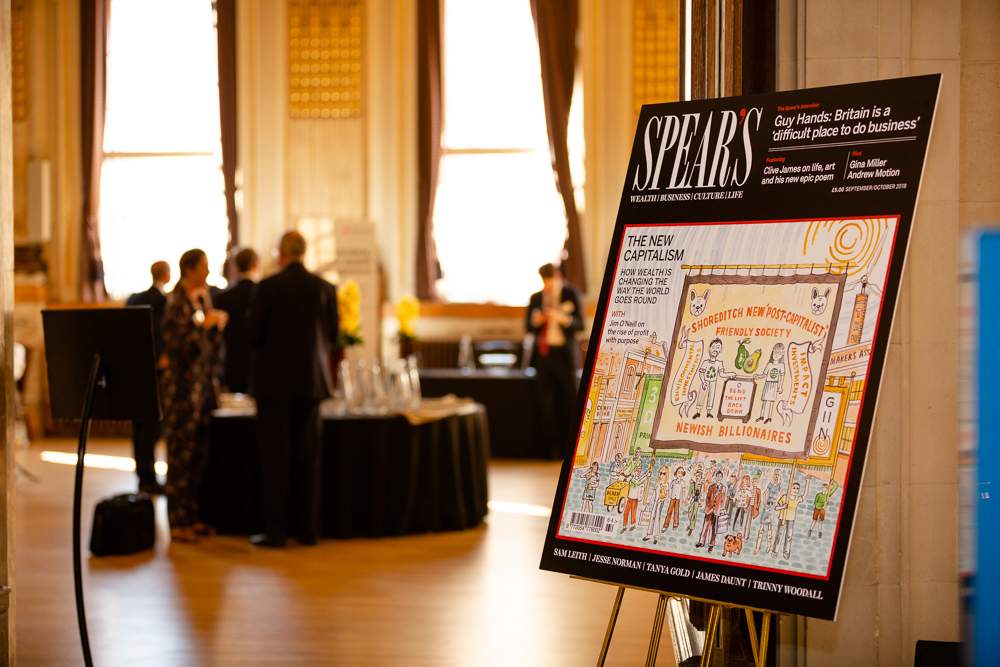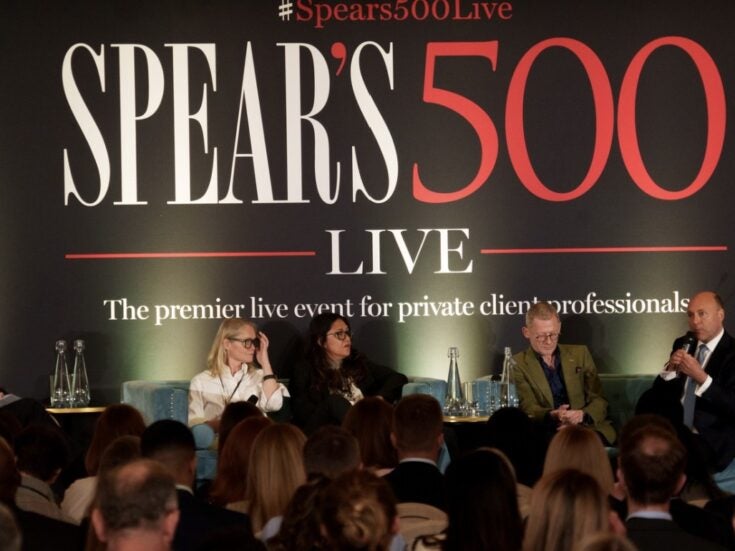
The Spear’s 2018 Wealth Insight Forum, the annual meeting of HNW minds, started with Stephanie Flanders on Brexit and ended with Lord O’Neill’s insights on the future of wealth. Emelia Hamilton Russell reports
Headlined by Stephanie Flanders, Lord O’Neill, James Daunt and Robert Amsterdam, Spear’s has hosted an exclusive day of industry insights and networking for some 200 guests at the annual Wealth Insight Forum.
Guests gathered at One Great George Street, Westminster, to hear from 28 expert speakers on issues ranging from geopolitics, bionic investing, the future of the high street and London property, to tax, trusts and residency trends, and the huge strides in addressing mental wellbeing. The event concluded with a lively discussion featuring Jim O’Neill on the broader theme of the day: the future of wealth.




Stephanie Flanders, from Bloomberg, opened the forum, offering incisive analysis of the economic outlook. ‘There’s less capacity in the global economy’, she said, cautioning in respect of fears of an end to the bull market: ‘It’s a bit of a ticking clock – the probability of a recession goes up as you start to run out of economic slack.’ Tentatively predicting that the next financial set-back would be ‘in two to three years’ time, Flanders noted it was likely to be a relatively mild disruption – rather than the existential crisis of a decade ago. Flanders added: ‘The global economy is stronger than financial markets.’ So where might the next crash come from? ‘Debt,’ she said, warning that emerging market corporate debt could be the straw that breaks the camel’s back.
Next, Payne Hicks Beach immigration lawyer Katherine Bradbury kicked off the first panel of the day – on HNW global citizenship, sponsored by Henley and Partners and Finance Malta. Bradbury asserted that ‘citizenship is a commodity like any other.’ She was joined by Henley and Partners’ Irina Curbelo, and Przemyslaw Koger from Alter Domus based in Malta. ’There’s so much volatility in the world at the moment, that HNWs don’t necessarily want to move country or move assets immediately, but they do want to have the option to,’ Koger observed. What are HNWs looking for when it comes to deciding where to live in the world? Security, freedom of settlement and travel – and the quality of the business infrastructure and legal environment. While the panellists disagreed on which passport is the best (probably a French one), when asked about how many passports a modern HNW needs, the response was unanimous: ‘as many as possible.’
Trump’s Tactics
International lawyer and Spear’s columnist Robert Amsterdam returned to the wealth insight forum to offer his geopolitical outlook. Amsterdam set a serious tone as he talked about how HNWs are facing the ‘highest point of risk’ for their individual investments. He believes that Donald Trump’s America is leading the world into an era of deinstitutionalisation and said that the rise of clickbait and fake news has driven us, ‘to the extreme margins of political thought.’ Trump wants to ‘tear up the rulebook for trade’, Amsterdam told the forum, and replace them with a new ‘America First’ ideology. He believes that the trade war between the US and China is not really about trade at all. Rather Trump feels that the US has been outmanoeuvred by the Chinese, said Amsterdam, who predicted that the upcoming midterms would result in Trump’s impeachment. He also trenchantly advised the audience not to bet against the US in the US-China trade war.
James Daunt, managing director of Waterstones, was next to step up to the platform. He talked to Spear’s deputy editor Christopher Jackson about Waterstones’ recent acquisition of Foyles and how he managed to protect the company from the ravages of Amazon and still reject ‘the pernicious uniformity of a chain.’ On his first day at Watersones, Daunt asked the staff why they were all in uniform. After conversing amongst themselves, the answer eventually came back as ‘because you don’t pay us enough to buy our own clothes’. ‘Corporate cultures are very difficult things to change,’ said Daunt. ‘It took me two years, but now no one wears a uniform.’ Looking to the future Daunt has broad ambitions for Waterstones: ‘The growth in English reading on the continent is growing – it would be extremely nice if Waterstones was running shops in Paris and Rome,’ he said. ‘But the moment I say “Paris” my whole team are going to want to go off there, and there’s plenty of opportunity in the UK.’ The Foyles acquisition is an illustration of that.’


Bionic investing
The topic of ‘Bionic investing: how technology will empower humans to reimagine wealth management’, sponsored by wealth manager Dolfin, brought together Dolfin’s Georgios Ercan, Iqbal Gandham, UK managing director of eToro, Werthstien’s Giles Keating and Veritas’ Cordelia Bowdery. The expert panel discussed the changing relationship between technology and humans in wealth management, with Bowdery championing the importance of face-time for clients with CIOs. Ercan and Gandham meanwhile were united in their desire to see a step change across wealth management, and an influx of technology that can reduce costs for investors, raise transparency and empower decision-making. Technology can ‘do for wealth management what Uber did for transport,’ asserted Gandham. When asked about how robo-advisory could potentially help clients weather another financial crash, Ercan said, ‘There’s no trick or clever solution that can insulate people against a financial crisis. You’ve just got to carry on being efficient, secure and reliable.’
Taxing times
The changing tax landscape for HNWs is increasingly throwing lawyers and advisers into new moral territory, according to Maurice Turnor Gardner’s Clare Maurice speaking on the tax and trust panel. ‘There used to be a clear divide between tax evasion, which is wrong, and tax avoidance, which is legal and sensible. Now what they call “aggressive tax avoidance” is illegal, and so the lines are blurred.’ She, together with distinguished tax lawyers Robert Broderick of Payne Hicks Beach and James Quarmby of Stephenson Harwood, and the City University of London international politics lecturer Dr Ronen Palan discussed topical issues including non-dom tax changes and the landscape post-Brexit, as well as privacy and information security. All agreed that the theory behind the Common Reporting Standard (CRS) was sound, but Quarmby voiced reservations: ‘The problem I have with it is data protection. Your data is safe in France, but it’s certainly not safe in China and Russia, both of which have signed up to CRS. HNWs are worried about fraud, they’re worried about cybercrime and they’re worried about kidnapping.’
A more insidious, though no less dangerous, threat was discussed next in a panel dedicated to HNW wellbeing, sponsored by Addcounsel. Psychiatrist Dr Richard Sherry, Jonathan Edgeley from Addcounsel, and Sandy Loder from Peak Dynamics, discussed control, anxiety, resilience and the disconnect between net worth and self-worth. Rachel Kelly, a former Times journalist and best-selling author, was open about her experiences with acute depression and talked of the way HNWs will often hide their condition, ashamed that they suffer despite enjoying a life of great privilege. ‘One in four people will experience a behavioural or mental health condition in their lifetime, and wealth certainly can’t buy immunity from that statistic,’ Jonathan Edgeley concluded.
Next on the agenda was property, and Spear’s founder and editor-at-large William Cash sat down with a panel, including top tier London property advisors Trevor Abrahmsohn, Louise Hewlett, Richard Rogerson and Caroline Takla, to offer their bulletin from the front line. ‘To buy a property in London today, the regulations are unbelievably stringent,’ Hewlett said of London’s attempt to clean up its reputation. ‘It’s our responsibility as agents to ask any new client where they got funds from.’
Russian dough
‘The Russians have bought some very significant property this year, despite various geopolitical issues,’ added Abrahmsohn. ‘Mrs May trying to tweak the tails of Putin’s cronies by attempting to restrict their movements is futile. It’s really not a big deal for them. There are no handcuffs, they can do exactly what they’ve always done – it just takes a few minutes longer.’ All in all, the panellists are confident that Russians, and HNWs from all over the world for that matter, still regard London property as the ultimate trophy asset.
Jim O’Neill joined the stage for the final discussion on the future of wealth, chaired by Alec Marsh, alongside Ian Barnard, one of three founding partners of Capital Generation Partners and Victoria Leggett, head of responsible investment at UBP. What impact would Brexit have on wealth in London? ‘It’ll do what it’s going to do,’ said O’Neill. ‘Although I’m an objective Remainer, I don’t think Brexit is the biggest threat to the UK economy.’ O’Neill believes that the main problems facing the UK are the 20 per cent in ‘lost’ productivity over the last decide, coinciding with profound generational inequality and regional inequality. CapGen’s Barnard had a more optimistic outlook. Commenting on the rise of impact investment and ESG funds among millennial investors especially, said that he could see a future where ‘100 per cent of investments are sustainable’. Querying this, Victoria Leggett wondered ‘can an arms dealer ever be sustainable?’ Denis Nagy, CEO of asset manager Dolfin, said that sustainable investing is one of the trends he’s seen, but by no means the main one. In the end, while there was some debate over what Barnard calls ‘enlightened ownership’, the overwhelming consensus was that in an era of rising populism, ‘profit with purpose’ – as O’Neill put it – is the future and has a fundamental part to play in the future of wealth. As O’Neill said, ‘It’s wake up time…’
Concluding the 2018 Spear’s Insight Forum, editor Alec Marsh thanked the sponsors – Henley and Partners, Finance Malta, Addcounsel, Dolfin, Butterfield and GCS Property Investment – and the attendees. ‘If the Spear’s Wealth Insight Forum is anything,’ he said. ‘It is a meeting of HNW minds – and yours are the ones that count.’
Emelia Hamilton-Russell is a writer at Spears, with additional reporting by Emily Bevan
Sponsored by:







